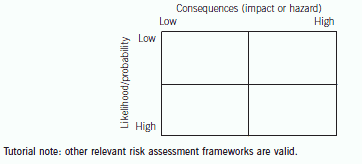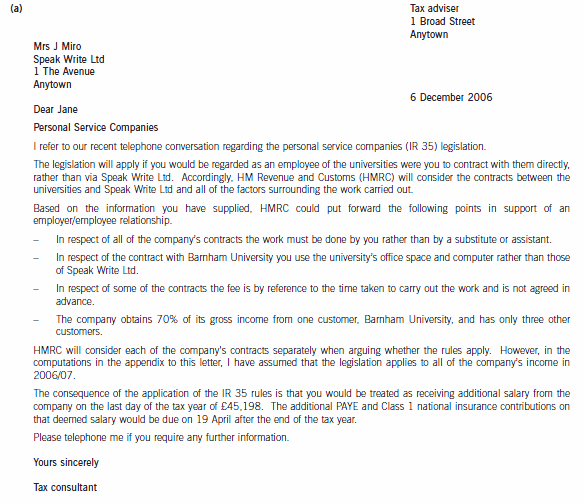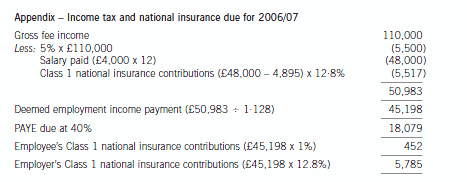ACCA考试缺考会有什么影响?了解一下?
发布时间:2020-08-14
ACCA考试缺考会有什么影响?小伙伴们想要知道吗?下面51题库考试学习网就带领大家一起来了解看看,关于ACCA考试缺考的影响,想要了解的小伙伴赶紧来围观吧。
如果缺考ACCA,对于考生的影响主要有以下几点:
1.经济损失
对于ACCA有所了解的小伙伴,相信对于ACCA各科目的考试费用还是有一定了解的。考一次ACCA动不动就要几百英镑的考试费,如果附近没有ACCA考点,还得算上来往的交通费、住宿费等,可以说考一次ACCA所要付出的“代价”。如果一旦缺考,那么,官方是不会退还已报名的考试费用的,而且不会抵扣下次的费用。
2.考试政策变化风险
虽说ACCA每年的考纲大体上不会出现比较大的调整,但是很难保证哪一考季就遇到考纲调整。为了让大家更加快速地通过考试,还是建议大家能够适当地缩短备考周期,考纲的变动导致大把的学习和复习时间被白白浪费了。
3.成绩有效期限制
ACCA有效期新规显示,ACCAF阶段不再设有时间限制,从P阶段通过第一门开始算有七年有效期,如果七年内没有全部通过,成绩将从开始考P阶段第一年的科目开始滚动式作废。ACCA学员有七年的时间通过专业阶段的考试(即SBL和SBR,以及P4-P7中的任选两门)。如果学员不能在七年内通过所有专业阶段考试,超过七年的已通过专业阶段科目的成绩将作废,须重新考试。七年时限从学员通过第一门专业阶段考试之日算起。每弃考一次,就离成绩作废的deadline又近了一步。
一般来说,ACCA考试缺考经济上不划算是首位的,如果自己没有特别要紧的情况处理,建议还是要好好准备去参加考试,尽量不要缺考。
由此可见,ACCA考试缺考的话,不会有什么不好的影响,尽管如此还是不建议已经报考的小伙伴缺考。ACCA考试科目多,对于备考的小伙伴们来说应该要尽量缩短备考的周期,如果缺考的话,就会延长备考的周期,而且ACCA考试成绩是有有效期的,缺考只会让有效期缩短,增大备考的压力,所以小伙伴们在弃考之前一点要考虑清楚哦。如果大家对于ACCA考试还有其他问题,可以多多关注51题库考试学习网,我们将继续为大家答疑解惑。
下面小编为大家准备了 ACCA考试 的相关考题,供大家学习参考。
(b) Describe a framework to assess the risks to the progress of the Giant Dam Project. Your answer should
include a diagram to represent the framework. (6 marks)
(b) Framework for assessing risk
Risk is assessed by considering each identified risk in terms of two variables:
– its hazard (or consequences or impact) and,
– its probability of happening (or being realised or ‘crystallising’).
The most material risks are those identified as having high impact/hazard and the highest probability of happening. Risks
with low hazard and low probability will have low priority whilst between these two extremes are situations where judgement
is required on how to manage the risk.
In practice, it is difficult to measure both variables with any degree of certainty and so if is often sufficient to consider each
in terms of relative crude metrics such as ‘high/medium/low’ or even ‘high/low’. The framework can be represented as a ‘map’
of two intersecting continuums with each variable being plotted along a continuum.

6 Charles and Jane Miro, aged 31 and 34 years respectively, have been married for ten years and have two children
aged six and eight years. Charles is a teacher but for the last five years he has stayed at home to look after their
children. Jane works as a translator for Speak Write Ltd.
Speak Write Ltd was formed and began trading on 6 April 2006. It provides translation services to universities. Jane,
who ceased employment with Barnham University to found the company, owns 100% of its ordinary share capital
and is its only employee.
Speak Write Ltd has translated documents for four different universities since it began trading. Its biggest client is
Barnham University which represents 70% of the company’s gross income. It is estimated that the company’s gross
fee income for its first 12 months of trading will be £110,000. Speak Write Ltd usually agrees fixed fees in advance
with its clients although it charges for some projects by reference to the number of days taken to do the work. None
of the universities makes any payment to Speak Write Ltd in respect of Jane being on holiday or sick.
All of the universities insist that Jane does the work herself. Jane carries out the work for three of the universities in
her office at home using a computer and specialised software owned by Speak Write Ltd. The work she does for
Barnham University is done in the university’s library on one of its computers as the documents concerned are too
delicate to move.
The first set of accounts for Speak Write Ltd will be drawn up for the year ending 5 April 2007. It is estimated that
the company’s tax adjusted trading profit for this period will be £52,500. This figure is after deducting Jane’s salary
of £4,000 per month and the related national insurance contributions but before any adjustments required by the
application of the personal service companies (IR 35) legislation. The company has no other sources of income or
capital gains.
Jane has not entered into any communication with HM Revenue and Customs (HMRC) with respect to the company
and wants to know:
– When the corporation tax computation should be submitted and when the tax is due.
– When the corporation tax computation can be regarded as having been agreed by HMRC.
Charles and Jane have requested a meeting to discuss the family’s finances. In particular, they wish to consider the
shortfall in the family’s annual income and any other related issues if Jane were to die. Their mortgage is covered
by a term assurance policy but neither of them have made any pension contributions or carried out any other long
term financial planning.
Jane has estimated that her annual after tax income from Speak Write Ltd, on the assumption that she extracts all of
the company’s profits, will be £58,000. Charles owns two investment properties that together generate after tax
income of £8,500. He estimates that he could earn £28,000 after tax if he were to return to work.
The couple’s annual surplus income, after payment of all household expenditure including mortgage payments of
£900 per month, is £21,000. Charles and Jane have no other sources of income.
Required:
(a) Write a letter to Jane setting out:
(i) the arguments that HMRC could put forward, based only on the facts set out above, in support of
applying the IR 35 legislation to Speak Write Ltd; and
(ii) the additional income tax and national insurance contributions that would be payable, together with
their due date of payment, if HMRC applied the IR 35 legislation to all of the company’s income in
2006/07. (11 marks)


(c) Assess Mr Hogg’s belief that employing child labour is ‘always ethically wrong’ from deontological and
teleological (consequentialist) ethical perspectives. (9 marks)
(c) Mr Hogg’s belief that employing child labour is ‘always ethically wrong’
Deontological perspective:
In the case scenario, Mr Hogg is demonstrating a deontological position on child labour by saying that it is ‘always’ wrong.
He is adopting an absolutist rather than a relativist or situational stance in arguing that there are no situations in which child
labour might be ethically acceptable. The deontological view is that an act is right or wrong in itself and does not depend
upon any other considerations (such as economic necessity or the extent of the child’s willingness to work). If child labour is
wrong in one situation, it follows that it is wrong in all situations because of the Kantian principle of generalisability (in the
categorical imperative). Because child labour is wrong and potentially exploitative in some situations, the deontological
position says that it must be assumed to be wrong in all situations. The fact that it may cause favourable outcomes in some
situations does not make it ethically right, because the deontological position is not situational and the quality of the outcome
is not taken into account.
Teleological perspective:
According to the teleological perspective, an act is right or wrong depending on the favourableness of the outcome. It is
sometimes called the consequentialist perspective because the consequences of the action are considered more important
than the act itself.
In the teleological perspective, ethics is situational and not absolute. Therefore child labour is morally justified if the outcome
is favourable. The economic support of a child’s family by provision of wages for family support might be considered to be a
favourable outcome that justifies child labour. There is an ethical trade-off between the importance of the family income from
child labour and the need to avoid exploitation and interfere with the child’s education. Education is clearly important but
family financial support might be a more favourable outcome, at least in the short term, and if so, this would justify the child
working rather than being in school. For HPC, child labour is likely to be cheaper than adult labour but will alienate European
buyers and be in breach of its code of ethics. Child labour may be ethically acceptable if the negative consequences can be
addressed and overcome.
[Tutorial note: other, equally relevant points made in evaluating Mr Hogg’s opinion will be valid. The texts discuss teleology
in terms of utilitarianism and egoism. Although this distinction is not relevant to the question, candidates should not be
penalised for introducing the distinction if the other points raised are relevant]
(d) Advise on any lifetime inheritance tax (IHT) planning that could be undertaken in respect of both Stuart and
Rebecca to help reduce the potential inheritance tax (IHT) liability calculated in (c) above. (7 marks)
Relevant retail price index figures are:
May 1994 144·7
April 1998 162·6
(d) Stuart is not making use of his nil rate band, as all assets are transferred, exempt from inheritance tax (IHT), to Rebecca (as
spouse) on death. He should consider altering his will to transfer an amount equivalent to the nil rate band to his son, Sam.
If Stuart dies before altering his will, Rebecca can elect to make a Deed of Variation in favour of Sam instead. This will have
the same effect as the above.
Care should be taken in determining which assets are subject to this legacy. The Omega plc shares should not be transferred
to Sam as they currently attract 50% BPR. Instead, assets not subject to any reliefs (such as the insurance payout or cash
deposits) should be used instead. By doing this, IHT of £105,200 (£263,000 x 40%) could be saved on the ultimate death
of Rebecca.
It is too late for Stuart to make use of potentially exempt transfers (PETs) as no relief is obtained until three years have passed,
and full relief only occurs seven years after making the gifts. The same would also apply to Rebecca if she were to die on 1
March 2008. However, as she is currently in good health, she may decide to make lifetime gifts, although she should also
not gift the Omega plc shares for the reasons stated above as any gift other than of the entire holding will result in the loss
of BPR on the remainder.
Both individuals should make use of their annual exemptions (£3,000 per person per year). The annual exemptions not used
up in the previous year can be used in this current year. This would give a saving of £2,400 each (3,000 x 2 x 40%).
Exemptions for items such as small gifts (£250 per donee per year) are also available.
Gifts out of normal income should also be considered. After making such gifts, the individual should be left with sufficient
income to maintain their usual standard of living. To obtain the exemption, it is usually necessary to demonstrate general
evidence of a prior commitment to make the gifts, or a settled pattern of expenditure.
While there are no details of income, both Stuart and Rebecca are wealthy in their own right, and are likely to earn reasonable
sums from their investments. They should therefore be able to satisfy the conditions on that basis.
If Rebecca were to make substantial lifetime gifts, the donees would be advised to consider taking out insurance policies on
Rebecca’s life to cover the potential tax liabilities that may arise on any PETs in the event of her early death.
Tutorial note: the answer has assumed that the shares could be bought for £2·10, their value for IHT.
声明:本文内容由互联网用户自发贡献自行上传,本网站不拥有所有权,未作人工编辑处理,也不承担相关法律责任。如果您发现有涉嫌版权的内容,欢迎发送邮件至:contact@51tk.com 进行举报,并提供相关证据,工作人员会在5个工作日内联系你,一经查实,本站将立刻删除涉嫌侵权内容。
- 2021-01-13
- 2020-04-08
- 2020-01-10
- 2021-03-28
- 2020-01-10
- 2021-01-08
- 2020-03-19
- 2020-01-04
- 2020-01-10
- 2020-01-09
- 2020-02-22
- 2020-01-09
- 2020-08-13
- 2020-01-08
- 2021-01-13
- 2020-09-03
- 2021-01-13
- 2020-01-08
- 2020-02-27
- 2020-03-19
- 2020-01-10
- 2020-01-09
- 2020-01-08
- 2020-05-20
- 2020-01-08
- 2020-01-10
- 2021-01-08
- 2020-01-09
- 2020-01-10
- 2020-09-03